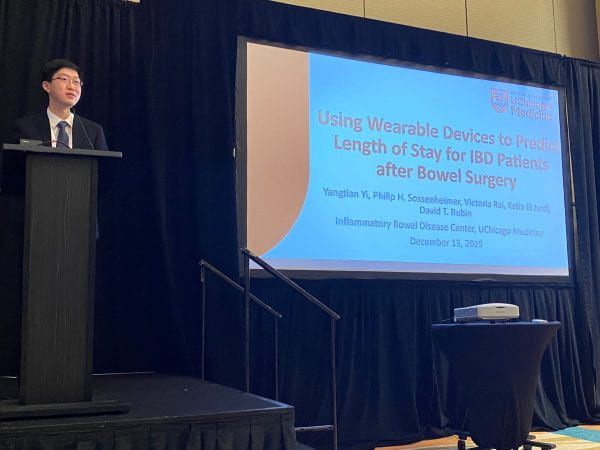NEWS
Endoscopic Phenotype: A Potential Predictor of Cuffitis Risk
Advanced IBD Fellow Shintaro Akiyama, MD, PhD presented a Quick Shot of his abstract on pouchitis involving the rectal cuff at Crohn’s and Colitis Congress. MedPage Today reported the results in the article here and Healio reported the results here. Very proud of Dr. Akiyama and his continuing work with characterizing pouchitis.
Hospital-stay duration after IBD surgery not linked to sleep, activity
Second-year Pritzker medical student, Yangtian Yi, received Best Abstract in Surgery at AIBD 2019 for his abstract associating length of stay for IBD surgical patients with data collected from wearable devices. His oral presentation and abstract was reported on by MedPage Today. Check out the article here. More to come from our amazing biosensor study!
Long-Duration Vancomycin Linked to Lower Rates of C. diff Recurrence in IBD
Pritzker medical student Donald Lei’s manuscript was accepted to the American Journal of Gastroenterology. Reuters Health Information reported on the study with comments by Dr. Rubin. “Our study did in fact demonstrate significantly reduced rates of recurrence (testing positive within 8 weeks after antibiotic cessation) and although reinfection rates (testing positive more than 8 weeks after antibiotics) were also lower, this finding was not statistically significant,” he said. “The latter was mainly a statistical power issue.” Congratulations Donald!
How to identify, manage patients with high-risk ulcerative colitis
Dr. Rubin discusses his presentation at ACG 2019 in San Antonio on identifying and managing patients with high-risk ulcerative colitis with Healio Gastroenterology. “The importance of knowing who is high risk has to do with your choices of treatment and your understanding of their prognosis in terms of their risk for colectomy or other adverse outcomes,” he said. “After you identify who they may be, we have to focus on treatments.” Read more here or watch the interview below.
G&E News Expert Picks by Dr. Rubin: Best of ECCO 2019
‘In this installment of “Expert Picks,” David Rubin, MD, the Joseph B. Kirsner Professor of Medicine; the chief of the Section of Gastroenterology, Hepatology, and Nutrition; and a co-director of the Digestive Diseases Center at the University of Chicago Medicine and Biological Sciences, highlights some of the most noteworthy research on IBD presented at the meeting.
Dr. Rubin’s selections cover efficacy and safety data on existing treatments as well as novel therapies in the pipeline, the first head-to-head study of biologic therapies, and a randomized trial of dietary management in children with Crohn’s disease.’
Dr. Rubin Taps in on “IBD Community Throwing Elbows Over Value of TDM” in Gastroenterology and Endoscopy News
Dr. Mark Silverberg, Dr. David T Rubin, Dr. Laura Targownik, and Dr. Charabaty excitingly discuss why IBD specialists are divided on the topic of therapeutic drug monitoring (TDM). “If the drug is going to work but isn’t present in the body, it doesn’t do its job,” Dr. Rubin said. In addition, when a biologic medicine is present in low concentrations, some patients develop neutralizing antidrug antibodies that clear the substance from the body. “The idea is to monitor the amount of drug, so we can anticipate loss of response by keeping the drug in the body,” he said. Find out what other experts said here.
“Monitor Histologically Normalized UC for Relapse” on MedPage Today
“These patients require ongoing monitoring and follow-up,” the study’s first author, Amanda M. Israel, MD, also of the University of Chicago Medicine, told MedPage Today.
Our graduating Advanced IBD Fellow, Amanda Israel, was published her findings on the “Follow-Up of Ulcerative Colitis Patients Who Have Achieved Histological Normalization” with Clinical Gastroenterology and Hepatology (available ahead of print here). Her findings describe one-third of patients with UC who achieved histological normalization became quiescent or active, adding to the discussion of whether histological healing should be considered a goal of remission in UC patients. Read more on the MedPage Today article.
Congratulations Amanda on being featured and best wishes for your future endeavors!
Runner’s World Features Fitbit Presentation
Philip Sossenheimer presented our work on wearable devices predicting disease activity in patients with IBD at Digestive Diseases Week 2019. Our study was featured in an article by Elizabeth Millard in Runner’s World titled, “Can Your Fitbit Tell You When a Common Digestive Disorder Will Start to Flare?” Check it out here!
U.S. News & World Report features Dr. Rubin in “What’s the Difference Between Colitis and Crohn’s Disease?”
“A distinguishing feature of ulcerative colitis is that it’s confined to the large intestine, which encompasses your colon and rectum, says Dr. David Rubin, chief of gastroenterology and a professor of medicine with University of Chicago Medicine. ‘Crohn’s disease can occur anywhere – most commonly it’s the last part of the small intestine where it joins the large intestine.’”
Can you name some other differences? You can find the full article here.
Dr. Rubin Moderates “Getting It Right: How to Manage Nutrient Deficiencies in IBD”
Available here by logging on to your Medscape education account, join Dr. Rubin and panelists Dr. Jason Hou, Dr. Raluca Vrabie, and Kelly Issokson discuss management of nutrient deficiencies in IBD patients.



